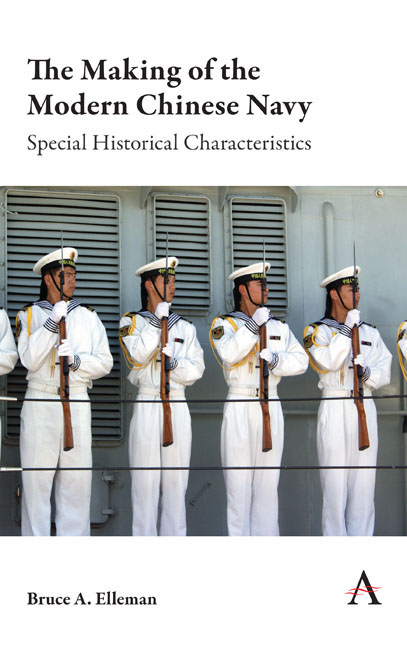Book contents
- Frontmatter
- Contents
- Introduction: The Special Characteristics of China's Maritime History
- 1 Battle of Bạch Đăng River (938)
- 2 Battle of Yaishan (1279)
- 3 Battle of Lake Poyang (1363)
- 4 Ming–Kotte War in Southeast Asia (1410–11)
- 5 Ming Loyalists Flee to Taiwan (1661–83)
- 6 Battle of Chuanbi (1839)
- 7 Sino-French War (1884–85)
- 8 Qing Beiyang Fleet's Defeat in the Battle of the Yellow Sea (1894)
- 9 Chinese Decision to Sink The Nationalist Navy as Blockships (1937)
- 10 Chongqing Mutiny Allowing the PLA to Cross the Yangzi River (1949)
- 11 The Taiwan Strait Crises (1954–55 and 1958)
- 12 China's Decision to Take the Paracel Islands from South Vietnam (1974)
- 13 Missile Blockade: The Taiwan Strait Crisis (1995–96)
- 14 The EP-3 Standoff and Diplomatic Resolution (2001)
- Conclusions: The Influence of History on the Formation of a Modern Chinese Navy
- Selected Bibliography
- Index
14 - The EP-3 Standoff and Diplomatic Resolution (2001)
Published online by Cambridge University Press: 04 October 2019
- Frontmatter
- Contents
- Introduction: The Special Characteristics of China's Maritime History
- 1 Battle of Bạch Đăng River (938)
- 2 Battle of Yaishan (1279)
- 3 Battle of Lake Poyang (1363)
- 4 Ming–Kotte War in Southeast Asia (1410–11)
- 5 Ming Loyalists Flee to Taiwan (1661–83)
- 6 Battle of Chuanbi (1839)
- 7 Sino-French War (1884–85)
- 8 Qing Beiyang Fleet's Defeat in the Battle of the Yellow Sea (1894)
- 9 Chinese Decision to Sink The Nationalist Navy as Blockships (1937)
- 10 Chongqing Mutiny Allowing the PLA to Cross the Yangzi River (1949)
- 11 The Taiwan Strait Crises (1954–55 and 1958)
- 12 China's Decision to Take the Paracel Islands from South Vietnam (1974)
- 13 Missile Blockade: The Taiwan Strait Crisis (1995–96)
- 14 The EP-3 Standoff and Diplomatic Resolution (2001)
- Conclusions: The Influence of History on the Formation of a Modern Chinese Navy
- Selected Bibliography
- Index
Summary
Diplomacy with China can avoid war. When a US EP-3 surveillance plane was forced to land on Hainan Island after a collision with a Chinese fighter plane, US Ambassador Joseph W. Prueher conducted ten days of intensive negotiations with Beijing to bring about the release of the plane's crewmembers. To end the crisis, Prueher submitted a letter to Beijing, stating, “Please convey to the Chinese people and to the family of pilot Wang Wei that we are very sorry for their loss. […] We are very sorry the entering of China's airspace.” In English, the word sorry does not necessarily imply responsibility. In the Chinese translation of Prueher's letter, however, it did: “The Prueher letter is translated by Chinese officials as both feichang bao qian, or ‘very sorry,’ and wan xi.” Meanwhile, “a copy of the US Embassy Chinese translation of the same letter only uses wan xi.” This letter placated China, which led to the release of the American crew. Prueher later explained that much of negotiating with China is building ladders to let them climb down from untenable positions.
Summary of the April 1, 2001 EP-3 Incident
On April 1, 2001, following a collision between a Chinese and American plane, the damaged US EP-3 surveillance plane landed on Hainan Island without permission from the Chinese authorities. The plane and its crew were immediately detained. To resolve the EP-3 standoff, former US admiral and at that point the US ambassador to China, Joseph Prueher, worked closely with Annapolis classmates, including Richard Armitage, Secretary of State Colin L. Powell's deputy at the State Department, and Admiral Denny Blair, who was CinCPac. At one crucial stage of the negotiations, Admiral Blair offered to send an aircraft carrier to China. This would normally have been Prueher's favored solution, as shown by his actions in 1995–96. But the ambassador declined this suggestion, fearing that too strong a signal might backfire and lead to the prolongation of the incident.
Almost exactly ten days after the April 1, 2001, collision between a US EP-3 surveillance plane and the Chinese jet fighter, Ambassador Prueher delivered the final draft of what became known in Washington as the “Two Very Sorries Letter” to Beijing officials with the message that it would be the Bush administration's best and final offer.
Information
- Type
- Chapter
- Information
- The Making of the Modern Chinese NavySpecial Historical Characteristics, pp. 69 - 72Publisher: Anthem PressPrint publication year: 2019
